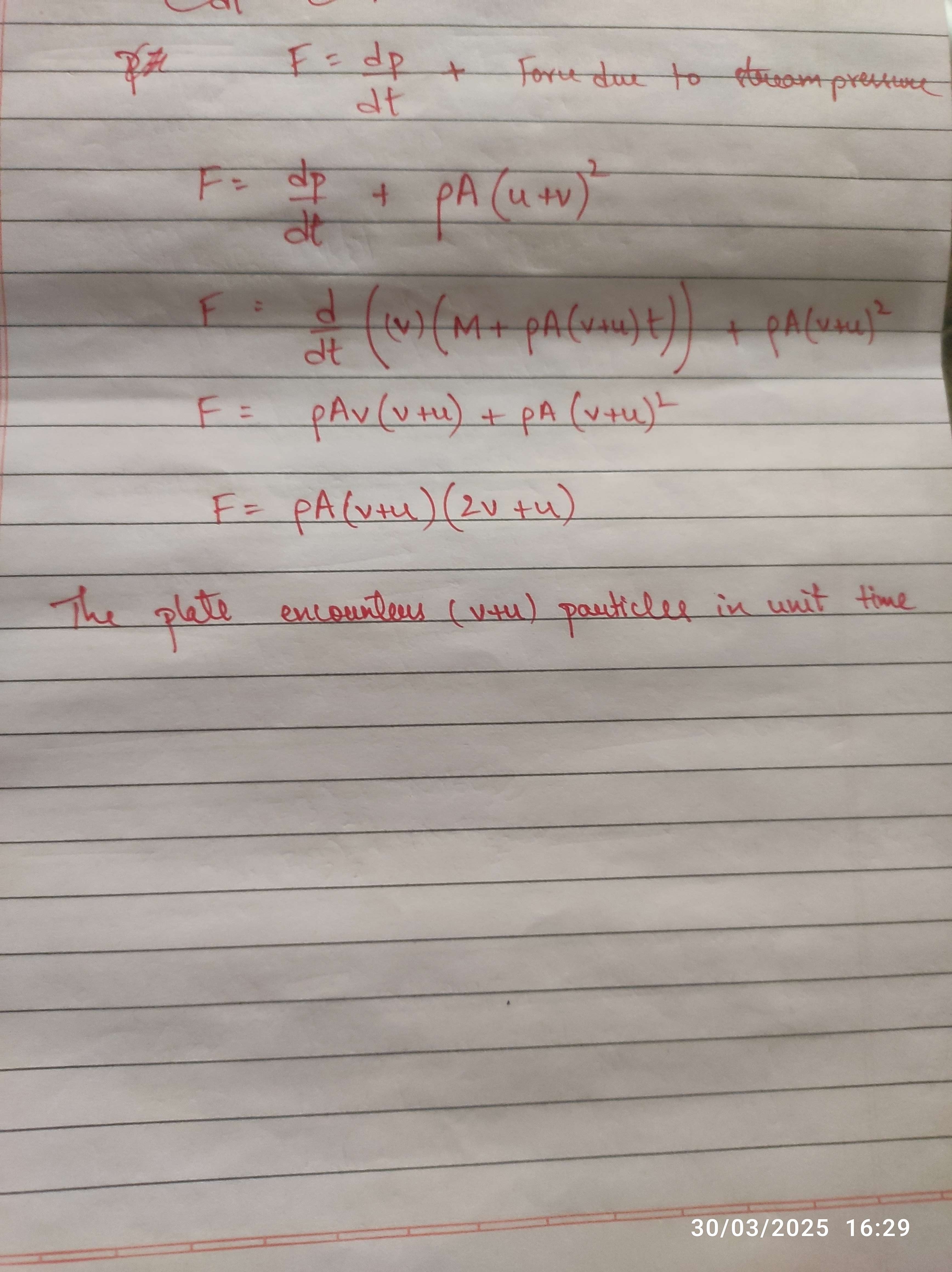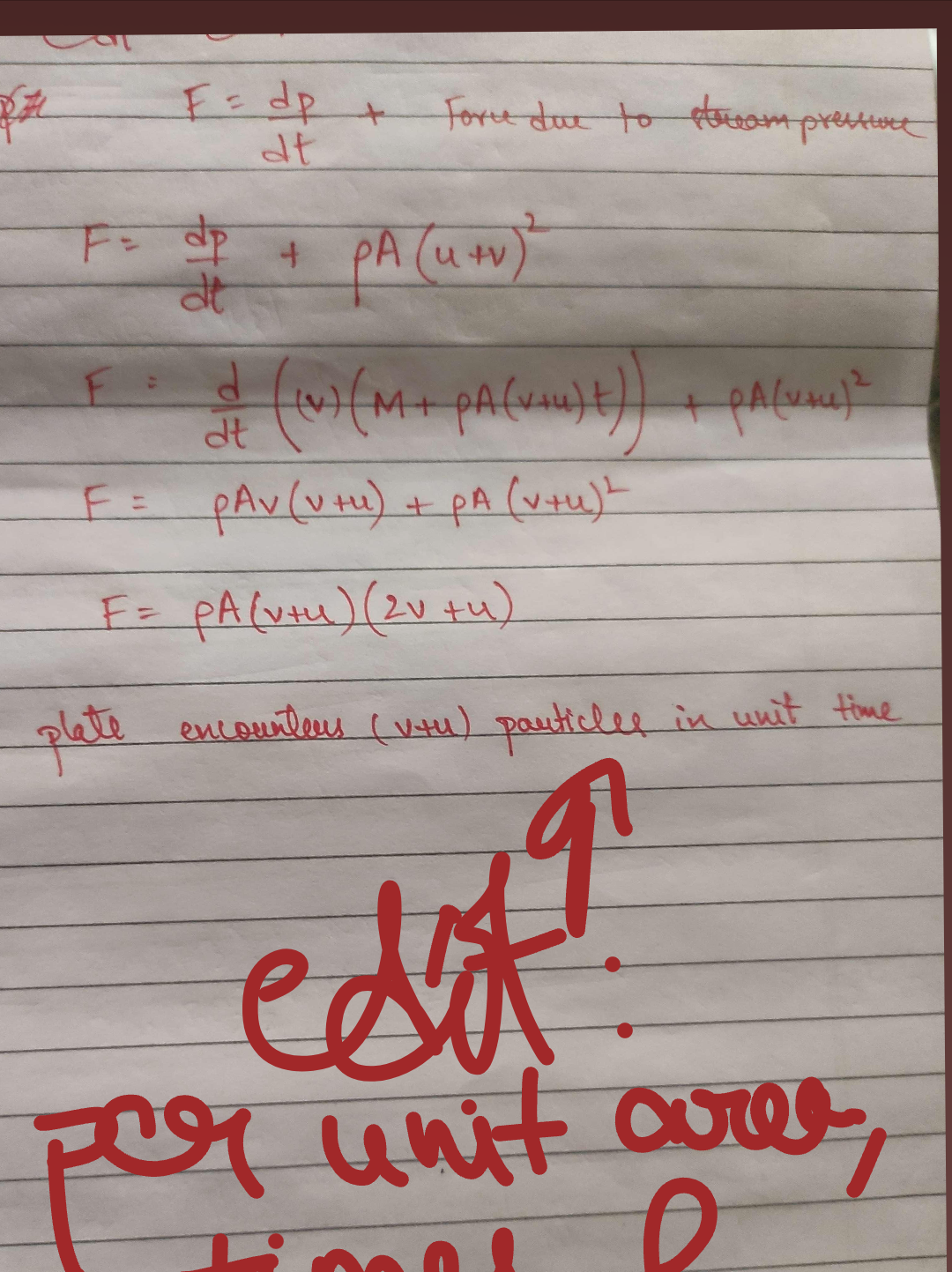49 Replies
@Gyro Gearloose
Note for OP
+solved @user1 @user2... to close the thread when your doubt is solved. Mention the users who helped you solve the doubt. This will be added to their stats.dm/dt = rho A (v+u)
Mv+ Fdt = (M+dm)v - dmu
Fdt = dm(v-u)
F= rho A (v^2 -u^2 )
where am i going wrong
Is it F = ρA(v+u)(2v+u) ?
got it nvm
I did it like this

thoda sign ki galti
this is wrong tho
Why?
applying impulse momentum theorem
Fdt= (M+dm)v - (Mv-dmu)
What's that theorem?
change in momentum = F.dt integration
Ok....
ans aint matchin with key
Could you wait for a bit to close the thread?
Now I have this doubt
yeah sure
Fdt = dm(v+u) , substitute dm from first msg

??
where did steam come from
Stream.
Not steam
oh mbmbmb
As in, it can be approximated as a fluid due to it being approximately continuous flow
F = Fth cuz constant velocity
yeah isse ho jayga aage
oh
yeah there's some issue with that
the force from the stream particles is the thrust force
and whenever we use thrust force we use mdv/dt
instead of dP/dt
cuz it is designed in this way
Yes, but that's fine here since the mass of the stream itself isn't changing. It's assumed to be infinite
Oh I see your point nvm
no momentum of the block
I didn't get this
It's not going to be (v+u)² is what I meant.
uh can you please elaborate
@Opt did you get the issue?
I think I got it
we can't apply impulse momentum on the block itself cuz it does nothing
we need to apply impulse momentum on M + dm system
and using thrust force
F - Fth = mdv/dt
since dv/dt is zero
F = Fth
and Fth = (v+u)dm/dt and dm/dt = pA(v+u)
so F = pA(v+u)^2
@Opt can i close?
Yes yes. Sorry
all clear?
Wait a min, please. 😅
alrr
Yep, the velocity of the steam after impact is not zero relative to the plank no?
Ye, I got it
That would mean rather than thrust force, it would have to be more like a k.t.g scenario?
Pressure force is what I considered in the first place
No, that's my doubt 😅
It's similar to a fluid rather than a Maxwell-Boltzmann distribution imo since they don't have intrinsic kinetic energy
Each microscopic particle is considered to be massless, but the whole has a mass
Hmm, collision of particles with the wall must be elastic no?
As opposed to gases where we proceed with the assumption of massive particles.
Inelastic here by definition, since there is accumulation.
Ah I see...
Phrasing of the question could have been done better imo.
Oh but the coefficient of restitution isn't zero here is it? In the viewer frame.
I don't have paper on me, this is frustrating
No, it's zero nvm. They don't separate at all
Yep, the coefficient of restitution is the thing that's bugging me...
The relative velocity of separation is zero here because they're moving together after collision right?
I think that depends on what you assume, the vital information that's missing from the question.
Yeah, the accumulation isn't explicit here.
If the collision is taken to be elastic and dust particles very small, it is a ktg question. if inelastic and big particles, you can treat it like fluid.
It could be a non-stick surface for all we know
@hardcoreisdead ig you can close the thread now. 🙏
+solved @SirLancelotDuLac
Post locked and archived successfully!
Archived by
<@741159941934415883> (741159941934415883)
Time
<t:1743358569:R>
Solved by
<@1075951732460376214> (1075951732460376214)
